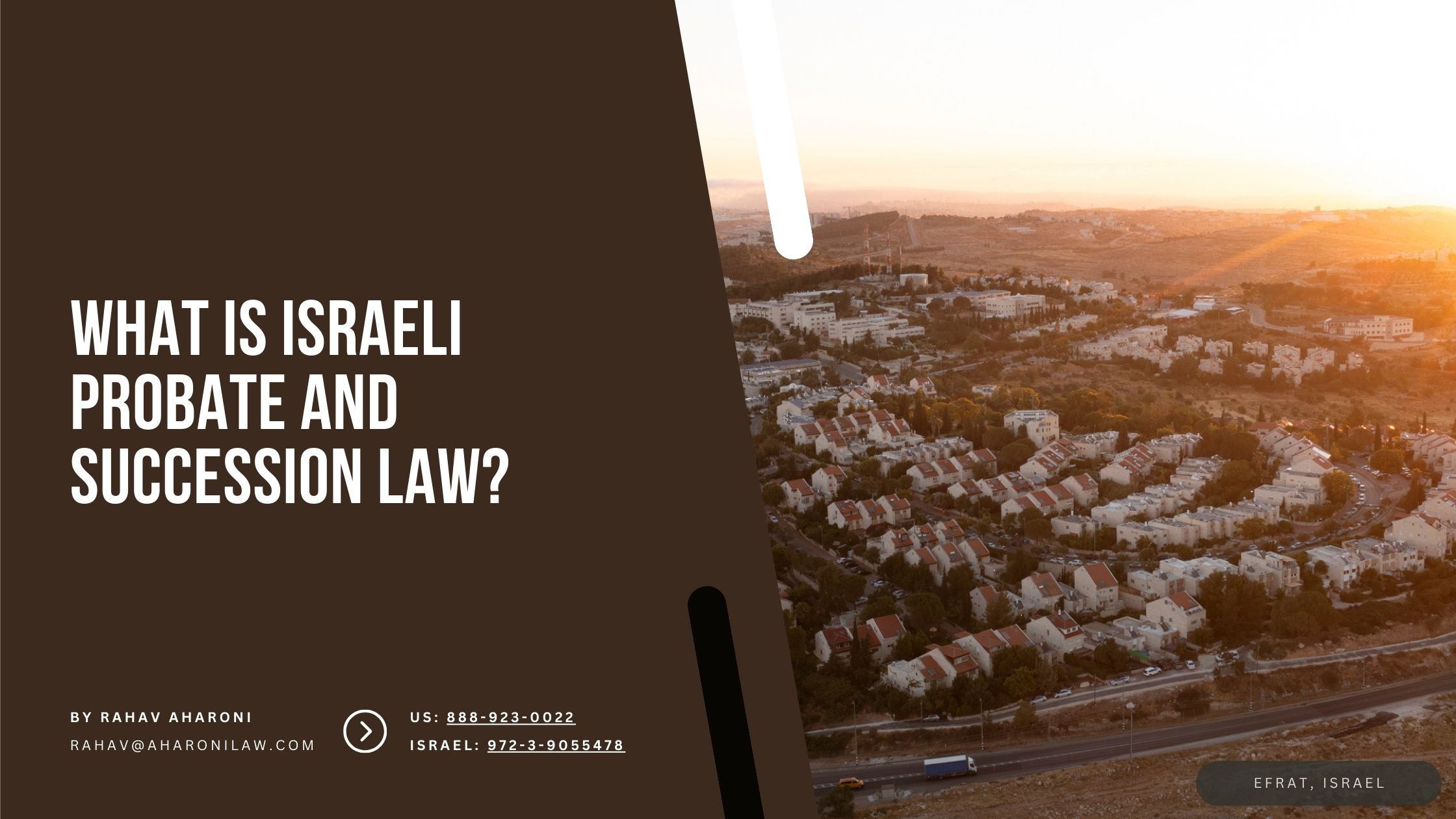Under Israeli Succession Law, if a testator leaves property in Israel, the Israeli courts have jurisdiction over the distribution of that property and estate to the legal heirs, whether or not the testator was a resident of Israel.
Inheritance law in Israel is governed by the Succession Law 1965 (‘Succession Law’). It is an old law that initially was adopted from Italian estate law. The Israeli courts, known as the Probate Court or the Family Court, have jurisdiction over the estate of any person who was a resident of Israel at the time of his or her death or who left a property in Israel.
The default presumption of Israeli inheritance law is stated in Section Number 1 of the Inheritance & Succession Law, which states that a man’s estate passes on to his heirs upon his death. This includes his fiscal assets, real estate, copyrights, etc.
How are Assets Bequeathed in the Israeli Registrar and Israeli Family Court?
Israeli law stipulates two ways to bequeath assets: by will or by law. If the deceased has left a will in Israel or in any other country, the inheritance will be distributed to the heirs as stipulated in the will, period. If the deceased hasn’t left a will, meaning the deceased is “intestate”, the heirs will be those specified by law, according to a clearly designated order of inheritance.
The order of inheritance according to the Israeli law of succession for those who passed away intestate (without a will) specifies heirs in the following order of priority:
- The deceased’s spouse at the time of death. (Note: The surviving spouse is the only relationship mentioned here who isn’t related to the deceased by blood. This may include a common-law spouse);
- The deceased’s offspring, including illegitimate and adopted children and their offspring.
- The deceased’s parents, grandparents, and their offspring.
The State of Israel inherits the estate in the absence of the heirs.
In the case of real estate, the inheritance will be divided equally between the deceased’s spouse and the deceased’s children. In cases where the estate has non-real estate assets like a bank account, stocks, or any other assets or chattels, the widow is entitled according to the domicile where he/she resides, that will over-rule Israeli succession law. This rate can vary significantly depending on the testator’s U.S. state of domicile.
The spouse will inherit the entire estate only if the deceased has NO children, siblings, or parents. Otherwise, the spouse is entitled to half the estate if the deceased is survived by children or parents, and two-thirds if the deceased is survived by only grandparents, siblings, or other relatives. The spouse is also entitled to inherit the deceased’s movable property, including motor vehicles, which were part of the shared household.
It is important to note that Israeli assets belonging to the surviving spouse prior to their marriage are not part of the estate that is to be inherited. Due to the operation of the Spouses (Property Relations) Law 5733 – 1973, the principles of joint ownership of property, or a property relations agreement such as a prenuptial agreement or “Prenup,” may include up to half of the value of the couple’s assets.
Also, according to section 6 of the Succession Law, an heir may withdraw from inheriting his or her part of the estate, but this may only be done if the estate has not yet been distributed.
Section 6 of the Inheritance law limits the right of withdrawal to an heir to ONLY three groups: siblings, spouse, or parents, including step-parents. So, for example, you cannot withdraw in favor of a nephew or a niece.
Inheritance by Will and Probate in Israel
Principles of Inheritance by Will
The fundamental principle of Israel’s inheritance law is that people are free to distribute their property as they see fit without any limitation, including to their spouse or children. Therefore, the succession law is contingent on the existence of a will. A valid will overrides the default stipulations of the law regarding the identity of the heirs and the distribution of the estate. A valid will may even annul an existing succession order (for instance, in cases where the will was uncovered only after the succession order was granted).
Roles and Boundaries of a Will
A will expresses a testator’s wishes regarding his Israeli legacy upon his death. It is not necessarily limited to property alone, although the issue of property is central. It is a binding legal document. A will may detail distinct instructions regarding one’s property and heirs. It may also be general, outlining only the general boundaries of its execution.
Ensuring an Updated Will or any Amendment
A will is not subject to obsolescence, and there is no limit on the number of wills a person may create. However, it is essential to note that the last valid will (chronologically) is the deciding one, overriding any former, older wills (unless the ‘new will’ is found faulty to the point of unlawfulness by a court of law). It is essential to ensure that a will is up to date, especially if any amendments and codicils – for instance, marriage, divorce, the acquisition of new property, etc. – have occurred.
4 Types of Wills Recognized in Israel

The law in Israel recognizes four types of wills:
– Handwritten Wills
(Section 19) The Handwritten Will must be written entirely in the testator’s handwriting (Note! A handwritten signature is not enough) and must bear the date of its composition in the testator’s handwriting.
In writing:
- Date
- Signature
All by his/her handwriting.
– Wills in the Presence of Witnesses
(Section 20) This type of will shall be in writing, bear the date of its composition, and must be signed by the testator and two witnesses on that same date.
– Wills in the Presence of an Authority
(Section 22) This may be submitted in writing or recited orally in front of a judge, the inheritance registrar, a member of a religious court, or a notary. The will must be accompanied by the testator’s testimony that this is indeed his will and must be signed and authorized by the authority.
This is the most solid will.
– Oral Wills on Death Bed
(Section 23) Also known as ‘DeathBed Will,’ this type of will is possible only if the testator is on his or her deathbed or believes he or she is facing imminent death (if the circumstances lend themselves to this belief). The will must be made in the presence of two witnesses who understand the testator’s language, and they must also put the will in writing, including its actual content, the date of its composition, and the circumstances that led to drafting the will in these circumstances. The will must then be deposited in the Inheritance Registrar’s Bureau. An oral will is void if, within 30 days of its creation, the testator is still alive and the circumstances that justified its making have passed.
Depositing a Will at the Inheritance Registrar’s Bureau
Once executed, a will can be deposited with the Inheritance Registrar’s Bureau. While not mandatory, this offers substantial benefits. In particular, it provides official proof of the will’s existence and ensures its safekeeping, mitigating the risk of loss or damage. Depositing a will at the Registrar is entirely technical – the Registrar does not check or vouch for the will’s validity on such an occasion. It is recommended that an attorney be consulted in such matters. Also, the content of the will and even the knowledge of whether a will has been deposited are undisclosed, even from heirs according to the will (so long as the testator is alive).
Execution of Wills: The Probate Order
An heir or anyone interested in executing a will may bring about its execution only through a probate petition and order, which the Inheritance Registrar grants. A probate order declares the validity and authenticity of an existing will. The probate decree validates the content of the will and is signed electronically by the court. The request for a probate order is publicized to allow objections to the will to be made.
Procedure for E-filing a Probate Order in Israel
A petition for a probate order must include the following documents:
- The original will, or, in case of its absence, a separate request to submit a copy of the original will, which includes why the original will may not be submitted, as well as proof of payment of government levy for the request.
- Proof of serving to all remaining heirs notifying them of the Probate petition.
- Foreign legal opinion.
- Other items depend on the case.
Beginning the Process of Inheriting Property in Israel When There is No Will (Intestate)
The succession petition is a valid judicial order under Israeli inheritance law. Like a court order or a decree, it does not suffer obsolescence and can be enforced years following its issuance. The court order does not specify the details of the distribution of assets among the heirs but only decides upon the identity of the heirs and their respective inheritance rights and inheritance tax in Israel.
The petition for a succession decree must be accompanied by many documents. Much of the required paperwork may now be E-filed. This can save heirs valuable time, energy, and funds.
It is advised to consult a lawyer regarding the exact procedural requirements of the process of requesting an Israeli Succession Order. Where the petition for the order is made by an attorney on behalf of an interested party, it must be accompanied by a power of attorney who functions as your proxy and fiduciary.
The Succession Registrar or family court may nullify or amend a Succession Order (or a Probate Order, which is discussed in a separate article). If the order was granted by a court of law, only a court of law may annul or amend it. Any interested party may request to annul a Succession Order; this right is not limited to the estate’s heirs. One of the most common examples of annulment of a Succession Order is when after the order is given it is found that the deceased had in fact left a will. In such a case the Israeli Succession Order may be annulled, and be filed by a new petition.
There is no estate/inheritance/death tax in Israel. However, some non-residents like those residents in the UK may have an estate tax in their domicile on any estate valued above £325,000. Canada’s rates vary.
Additional Requirements for Non-Israeli Residents
If the testator’s residence was not Israel, alongside the documents above, the petition must include additional documents, including proof of the existence of assets (such as the proof of ownership from a Land Registrar, authorization of an active bank account, etc.)
There is no Estate/inheritance/succession Tax in Israel for clients who are U.S. residents and Canada but the rate may vary from state to state or province to province.
Residents in Canada, the UK, Europe, and the EU are advised to call us and plan ahead of time.
Contact Aharoni Law Firm Today for A Free Consultation
Please contact us from the U.S. or Canada at 888-923-0022 or in Israel at (972) 3.9055478 or (972) 50.7322688 to schedule a complimentary consultation to discuss how we can simplify and how to navigate successfully through the probate and estate process.
Our law firm has completed hundreds of probates in Israel on behalf of non-residents – more than any Israeli law firm. Please review our references.


